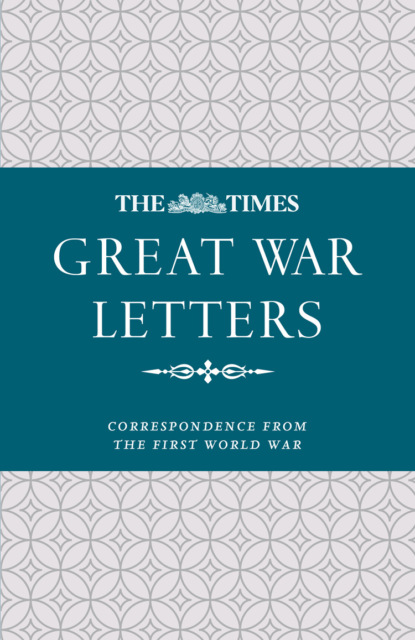По всем вопросам обращайтесь на: info@litportal.ru
(©) 2003-2024.
✖
The Times Great War Letters: Correspondence during the First World War
Автор
Год написания книги
2019
Настройки чтения
Размер шрифта
Высота строк
Поля
We have received from a correspondent, whose authority is beyond question, the following grim account of a visit to the victims of “gassing.”
Our correspondent complains that the whole truth about this diabolical form of torture is not sufficiently realized by the world. The publication of his letter should remove any doubts on the subject.
Yesterday and the day before I went with — to see some of the men in hospital at — who were “gassed” yesterday and the day before on Hill 60. The whole of England and the civilized world ought to have the truth fully brought before them in vivid detail, and not wrapped up as at present.
When we got to the hospital we had no difficulty in finding out in which ward the men were, as the noise of the poor devils trying to get breath was sufficient to direct us. We were met by a doctor belonging to our division, who took us into the ward. There were about 20 of the worst cases in the ward, on mattresses, all more or less in a sitting position, propped up against the walls.
Their faces, arms, hands were of a shiny grey-black colour, with mouths open and lead-glazed eyes, all swaying slightly backwards and forwards trying to get breath. It was a most appalling sight, all these poor black faces, struggling, struggling for life, what with the groaning and noise of the effort for breath. Colonel — who, as every one knows, has had as wide an experience as anyone all over the savage parts of Africa, told me to-day that he never felt so sick as he did after the scene in these cases.
There is practically nothing to be done for them, except to give them salt and water to try to make them sick.
The effect the gas has is to fill the lungs with a watery, frothy matter, which gradually increases and rises till it fills up the whole lungs and comes up to the mouth; then they die; it is suffocation; slow drowning, taking in some cases one or two days.
We have lost hundreds of men who died in the trenches, and over half the men who reached hospital have died. Eight died last night out of the 20 I saw, and most of the others I saw will die; while those who get over the gas invariably develop acute pneumonia. It is without doubt the most awful form of scientific torture. Not one of the men I saw in hospital had a scratch or wound.
The nurses and doctors were all working their utmost against this terror; but one could see from the tension of their nerves that it was like fighting a hidden danger which was over-taking every one.
A German prisoner was caught with a respirator in his pocket; the pad was analysed and found to contain hypo-sulphite of soda with 1 per cent. of some other substance.
The gas is in a cylinder, from which when they send it out it is propelled a distance of 100 yards; it there spreads.
Please make a point of publishing this in every paper in England. English people, men and women, ought to know exactly what is going on, also members of both Houses. The people of England can’t know. The Germans have given out that it is a rapid, painless death. The liars! No torture could be worse than to give them a dose of their own gas. The gas, I am told, is chlorine, and probably some other gas in the shells they burst. They think ammonia kills it.
The Germans had used banned chlorine gas for the first time on April 22 (against French and Canadian troops). The Allies soon followed suit.
POISON GAS
WHY RETALIATION IS NECESSARY
11 May 1915
SIR,—I HAVE JUST returned from the war zone in France, where I have had the opportunity of talking to those in high command, to medical officers, and to others at the front. I have also seen men brought down to the clearing station suffering from excruciating tortures and distress caused by the devilish gas launched against our forces by the barbarous and inhuman German scientists, the precise nature of which is not at present known for certain, the various exhalations apparently differing somewhat in character, though chlorine gas undoubtedly enters largely into its composition. People safely at home in England have so far both failed to realize the deadly nature of this gas and its soul-destroying properties, and our soldiers have no means of defence and are utterly powerless against it; but, notwithstanding the apathy of ignorance apparent in this country, those at the front are talking of little else than this mode of warfare inaugurated by the Germans, probably the most devilish ever invented by human ingenuity. No troops have proved themselves braver than the Canadians, the tale of whose prowess will be handed down among the deeds that saved the Empire for generations to come, though they would be the first to acknowledge that their bravery and patriotism was equally shared by the British regiments who stood by them shoulder to shoulder; but I know that the feeling of these brave men is that, while they are ready to make any sacrifice and take any personal risk for the good of the Empire, they cannot uselessly stand still to be overwhelmed and tortured by this poisonous gas, against which they have no efficient weapon of offence or defence. Up to the date of their using this gas the British Army looked upon the Germans with a good-natured tolerance; but their latest methods of warfare have converted this feeling into one of intense hatred, and I would not give much for the life of a German who comes within reach of a British or Canadian bayonet.
In this intensely critical situation it is up to the people of this country to use their utmost endeavour to immediately put means of protection and weapons of offence into the hands of our brave soldiers. I note with satisfaction that steps are being taken to provide a means of defence which has so far met with some measure of success; but we must hope that, difficult as the problem is, our scientists may be able to very shortly provide a complete means of protection from the poisonous miasma. Next, it is up against us in loyalty to our brave defenders, in spite of Hague Conventions, which the Germans entirely ignore, to place at the earliest possible moment in their hands a “counter-gas” that may teach the Germans a lesson. In the preparation of such a weapon, however, there is no call to imitate the barbarous cruelty of the Germans, for a gas might be prepared that would produce temporary unconsciousness without pain, and at the same time cause no ultimately injurious effect. No humanitarian could object to this, and everybody would be grateful except those pro-Germans of whom there are still for too many at large in this country.
It is most distasteful to me to appear to write in a spirit of exaggeration or of an alarmist, but I have seen sights that arouse one’s deepest indignation, and I cannot help thinking of 400 brave Canadians brought to a terrible death, before their comrades’ eyes, without being able to retaliate, and I cannot forget the purple flush that I saw on the faces of dying heroes, many of them splendid-looking men and unwounded, but to whom the Angel of Death was appearing in most dreadful form. The time has come when we must stifle sentiment, and be prepared in every case to meet force by force, and strategy by strategy, if we hope to eventually come out victors in the colossal struggle on which depends our very existence as a nation.
I am, Sir, your obedient servant,
ARMSTRONG
WHERE PROTEST IS DUE
11 May 1915
SIR,—THE SINKING OF the Lusitania, involving the cruel murder of hundreds of helpless and innocent non-combatants, affords those Germans who are naturalized British citizens holding prominent positions in this country an opportunity of performing an act which, even in the opinion of many who bear them no particular ill-will, is long overdue. We are in the tenth month of a war which has from the beginning been carried on by Germany with almost unspeakable treachery and vileness; but up to the present time not a single one of the distinguished Germans in our midst has thought fit to make a public avowal of his disagreement with the deliberate policy of barbarism pursued by the German Powers or to utter a word of indignation and disclaimer. Surely the moment has arrived when these gentlemen, in their own interests, if for no higher reason, should break silence and individually or collectively raise their voices against the infamous deeds which are being perpetrated by Germany. I venture to suggest that they might with propriety band together and present a loyal address to the King embracing an expression of their detestation of Germany’s methods of warfare; but perhaps this may be better left to their own discretion and good feeling. What I would emphasize, however, is that continued silence on their part lays them open to the supposition that, thinking that the fate of England is hanging in the balance, they are—to use the common phrase—sitting on the gate. A word of warning, therefore, is neither gratuitous nor unfriendly. The temper of this country, slow to rouse, is becoming an ugly one. The gate may fall from its hinges.
Your obedient servant,
ARTHUR PINERO
The British liner Lusitania had been sunk on May 7 off the coast of Ireland by a U-boat. Among the 1,200 who died were 128 neutral Americans. Despite official denials, the vessel had been carrying munitions.
MOBILIZE THE NATION
25 May 1915
HOW TO GET MEN AND SHELLS
SIR,—I HAVE JUST returned from the front, where I have spent the last month in giving what help I could to our chaplains and troops in Northern France and Flanders. It was the most glorious month I have ever spent, and I want, if I can, to pass on to others a few of the impressions which were burnt into my soul during that time—for the days are critical.
I had never doubted that the spirit of our troops was as fine as men told us it was, but I never realized how fine it was until I had lived in it and with it. It beggars description; it is amazing. It is all the more so when you realize, as you do when you are up at the front, that this spirit is there in spite of the fact that the men who show it feel it in their bones that somehow the nation is not backing them as the nation could and should. That, I am convinced, is the feeling right through the Army in France and Flanders; and the reason for it is not far to seek.
AT THE FRONT
After fighting desperately day and night for days and weeks, with frightful losses, the men who are left are dog tired and need a rest. When they are “pulled out” to get this rest, and after three days are sent back into the firing line again, the only conclusion they can draw is that there are not enough troops available to take their places. When battalion after battalion of infantry—and, as was recently the case in the Ypres salient, regiment after regiment of cavalry, too—have to sit in trenches day after day and night after night, being pounded by high explosives from enemy guns, with no guns behind them capable of keeping down the enemy’s fire, then the conclusion they draw is obvious—namely, that the nation has failed to provide sufficient guns of ammunition to meet those of the enemy. When night after night and day after day, the men in the trenches know that for every one hand grenade or rifle grenade or trench mortar bomb which they throw at the enemy they will get back in answer anything from five to 10, then the conclusion they draw is also obvious—namely, that the nation does not somehow realize the situation, or, if it does, has not made it its business to supply what is necessary. Man for man they know that they have nothing to fear either from German infantry or cavalry; they have proved it again and again. But they know also that it is little short of murder for a nation to ask men, however full of the right spirit, to face an enemy amply equipped with big guns and the right kind of ammunition, unless they are at last equipped with equally effective munitions of war.
There can be only one impression left on the minds of men in such a case, and that is, that somehow or other the nation does not know the truth, does not understand, and is not backing them, for, knowing the old country as they do, they have no doubt that if Germany can produce these things we can, if we will. And yet, in spite of it all, they carry on, they keep cheery, they do their best, they die gaily. The fact is that as a nation we are just gambling on this spirit. We know it to be there; we recognize it as the finest thing in the world; we believe it is unconquerable, whatever happens. So it is; but it will not win the war alone. It is this spirit, backed by guns and high explosives—legitimate munitions of war—which is going to smash this enemy of ours, and nothing else. Let no one think that we are going to do it by descending to the level of the German Imperial Staff and using any sort of gas. This talk of reprisals by gas (perhaps next we shall near of reprisals by poisoning water supplies!) is simply another method of chloroforming the nation and blinding its eyes to the real issue—the adequate supply of big guns and high explosive shells and other legitimate munitions of war.
THE SOLDIER’S QUESTION
And these munitions of war have to be made, not by the men at the front who are doing the fighting, but here in the British Isles. The men at the front know this; they know that the making of munitions of war, the making of clothes and equipment, the provision of food and of the thousand and one other things necessary to an army in the field—all these are just as much an integral part of the business as theirs is. And then they ask (I have heard them myself—wounded men in hospitals and whole men on the field), “Why should I, who enlisted under a voluntary system, because my part of the job is to loose of the ammunition my next-door neighbour at home has made, be compelled to do so under the extreme penalty of death for disobedience to orders or desertion from my job, while my neighbour at home is allowed to chuck his job with impunity whenever he wants to? Why should I be punished for refusing to go into the trenches because my pay is not raised a penny an hour, and the other fellow be allowed to strike and then be cajoled into going back to work by the special visit of a Cabinet Minister and the promise of extra pay? Why should I have to stick it out, night after night and day after day, in water and mud up to my knees, when the other fellow (who is only doing another part of the same job) can make his own conditions as to hours of work?”
Why, indeed? Why should any one of us who claims citizenship in the Empire, when the Empire is fighting for its very existence, be free to do what we like at such a time? That is the question I asked myself as I came away one evening from visiting a private soldier who had fought through the first three or four months of the war and had then deserted (his excuse was drink) and was to be shot, and was shot, and rightly too, at 5.30 the next morning. Why, indeed? That is what the men at the front are asking.
The news which they will have read these last few days will have put fresh heart into them all. For nine solid months they have been wondering why on earth the nation has not done what it has at last been decided to do—viz., to form a National Government. And now what? Is this National Government going to be the real thing or not? Is it going to be merely a combination of representatives of existing political parties on some sort of basis of numbers in the House of Commons? Is the cloven hoof of party politics still going to be found in it, or is it going to be a Government composed of the very best men whom the nation can produce, irrespective altogether of politics and parties? Is it still going to keep half an eye on votes, or is it going to get on with the one and only thing which matters now—the smashing of the enemy in the shortest time possible, for that is the object of war? Is this new Government going to tackle this business on the same ridiculous principles of voluntary service as heretofore, or in the only way in which it can be tackled with any certain hope of ultimate success? Is it going to tell the nation at once that we can’t win this war, and shall uselessly sacrifice thousands of lives, unless the Government has the power given to it to call upon the services of every single man, woman, and child, if need be, for whatever each individual is most capable of doing directly or indirectly for the accomplishment of the one object before us—the smashing of the enemy? The men at the front are waiting for the answer, and so are thousands of men and women here at home.
THE ONLY WAY
I say “the only way,” and for the following reasons:—
1. If the men at the front know that they have got the nation at their back, there need be no fear lest they will ever lose one iota of the glorious spirit which, in spite of lack of guns, has so far kept the enemy from our gate. They will wait, and wait gladly, for what they so sorely need, if only they know that at last this business is being taken seriously in hand.
2. It is the only way, for only so can our Commanders-in-Chief at sea and in the field lay their plans of campaign with any certainty that they will be able to carry them out. As it is now, it is simply a matter of fighting as best you can from hand to mouth. When the Government knows that they can call on all the resources of men and material, then, and then only, can they lay their plans for certain production at definite times. Only so can they be able to tell the Commanders-in-Chief what they can expect, and when.
3. It is the only way, because it is the height of impudent folly to imagine that we are as a nation so miraculously endowed by the Almighty that we, and we alone of all nations in the world, can prosecute such a war as we are engaged in to a successful issue without calling on the whole resources of the nation. At present we are treating it as a sort of “side show” to the real business of life, which must be kept going “as usual.” Besides, it is not playing the game by our Allies. They are keeping nothing back; we are.
4. It is the only way, because only so will the nation get the greatest efficiency out of its individual members. As it is, many men are now serving at the front who ought to be serving at home, and vice versa. The present method of “go or not as you please” is utterly haphazard and unbusinesslike, and therefore hopelessly inadequate.
5. It is the only way, because an essential factor in the successful prosecution of the war is that the right spirit should animate not only the men at the front, but the nation at their back. It is only the right spirit which will be able to bear the strain and see this thing through to a finish.
To-day the right spirit is lacking because the conscience of the nation is uneasy. As individuals we do not know whether we are doing the right thing or not—whether we should go on with our ordinary work or offer to go and fight. We are afraid of indulging in wholly innocent amusement. We are afraid even of having a really healthy laugh—somehow we feel it would not be right. People are getting gloomy and depressed, not because they have any fear as to the ultimate end of the war (they do not know enough about the real situation for that), not because they are not ready to face, and face gallantly, the sacrifices which war has laid upon them to make, but because their consciences are not at rest. You cannot have the right spirit if your conscience is uneasy.
A NATION UNDER ORDERS
That is why the men at the front have the right spirit. They are so gloriously cheery because their consciences are at rest. They know they have done and are doing the right thing. They have made the great surrender. They have burnt their boats behind them and put themselves under orders. Nothing matters except to “do their bit” when they are told to. When they are not wanted they have no silly scruples about enjoying themselves, the best they can. When the whole nation knows itself to be under orders, and knows that it is doing the right thing, we shall see the same spirit of gay surrender at home; and this spirit is essential. All we want is a lead, and a strong and fearless lead.
But will the nation stand it? Politics again! Well, if it won’t, it will have to stand something infinitely more distasteful before very long. But of course the nation will stand it. The nation will welcome it with both hands, once it is given a lead, once all are treated alike, once it is told the truth—not half-truths, which are worse than lies, but the real truth—that though we are holding the enemy through the indomitable spirit and the reckless self-sacrifice of our troops, we cannot and never shall be able to crush them until we provide our fighting men with a preponderance of munitions of war over and above the apparently ample and undiminished supply of the enemy. Advancing a few yards, or retiring a few miles, or merely holding the enemy—this is not going to win the war. It may produce a peace in the long run; but it will be a peace made in Germany and not of British manufacture.








